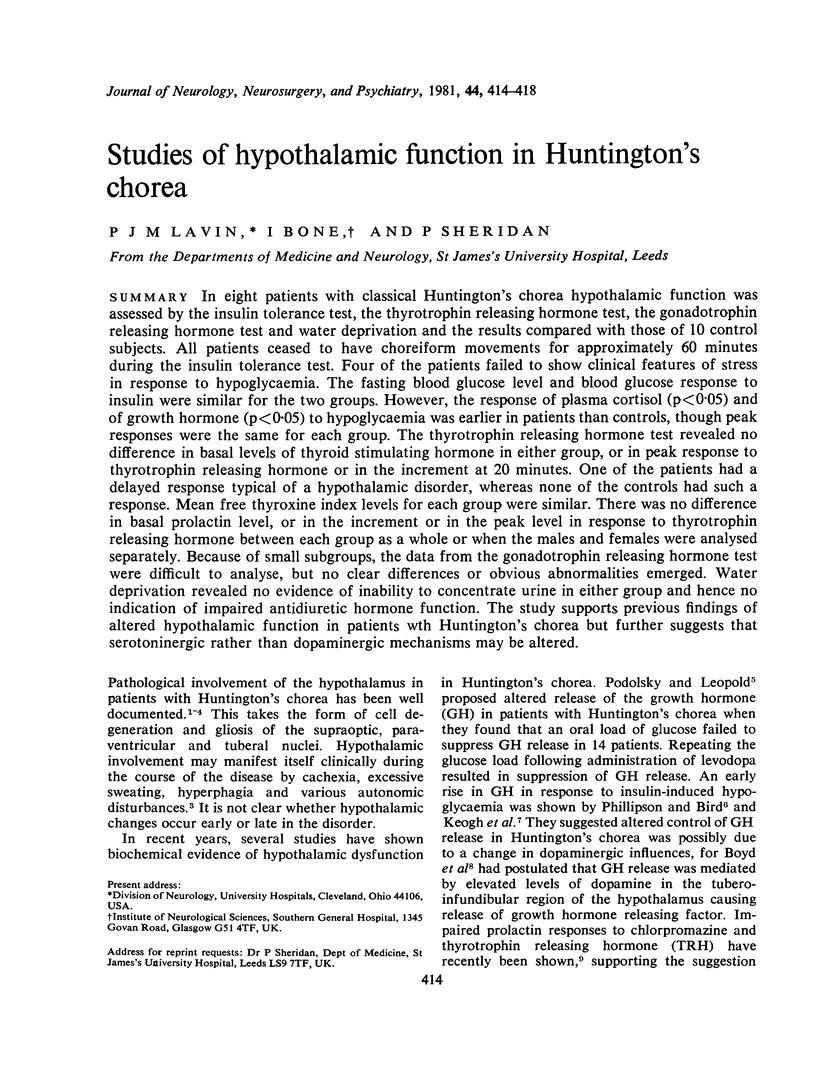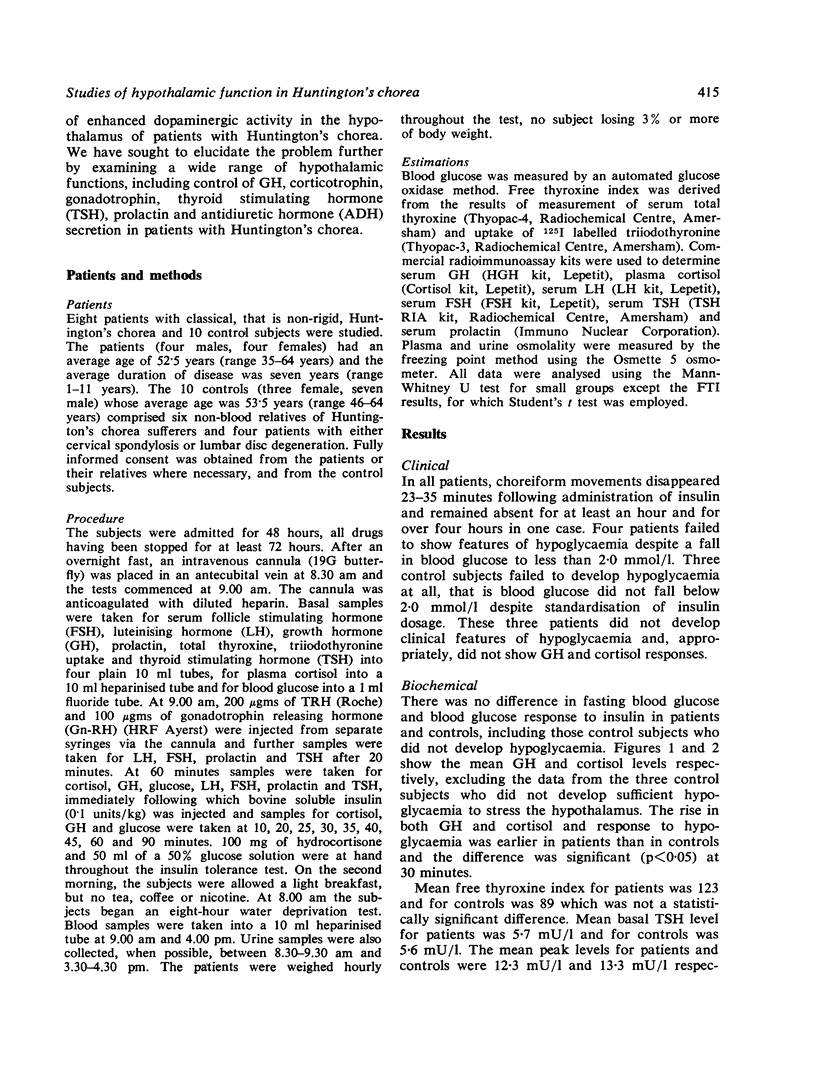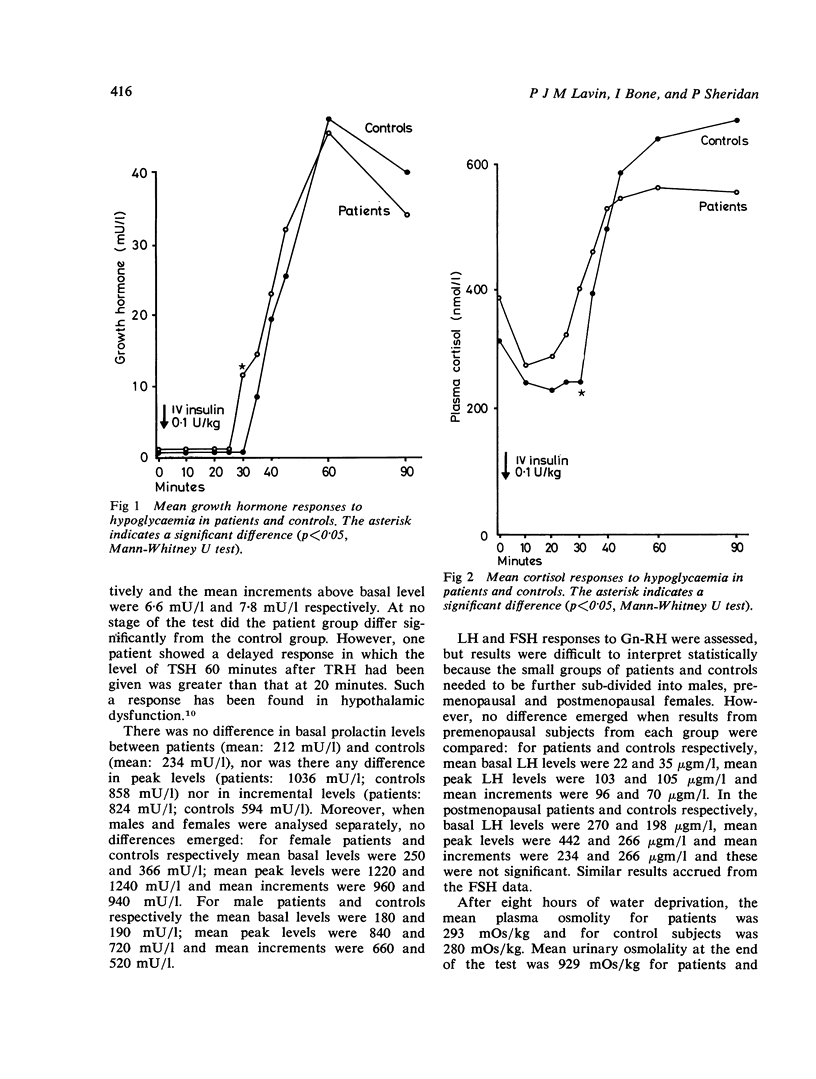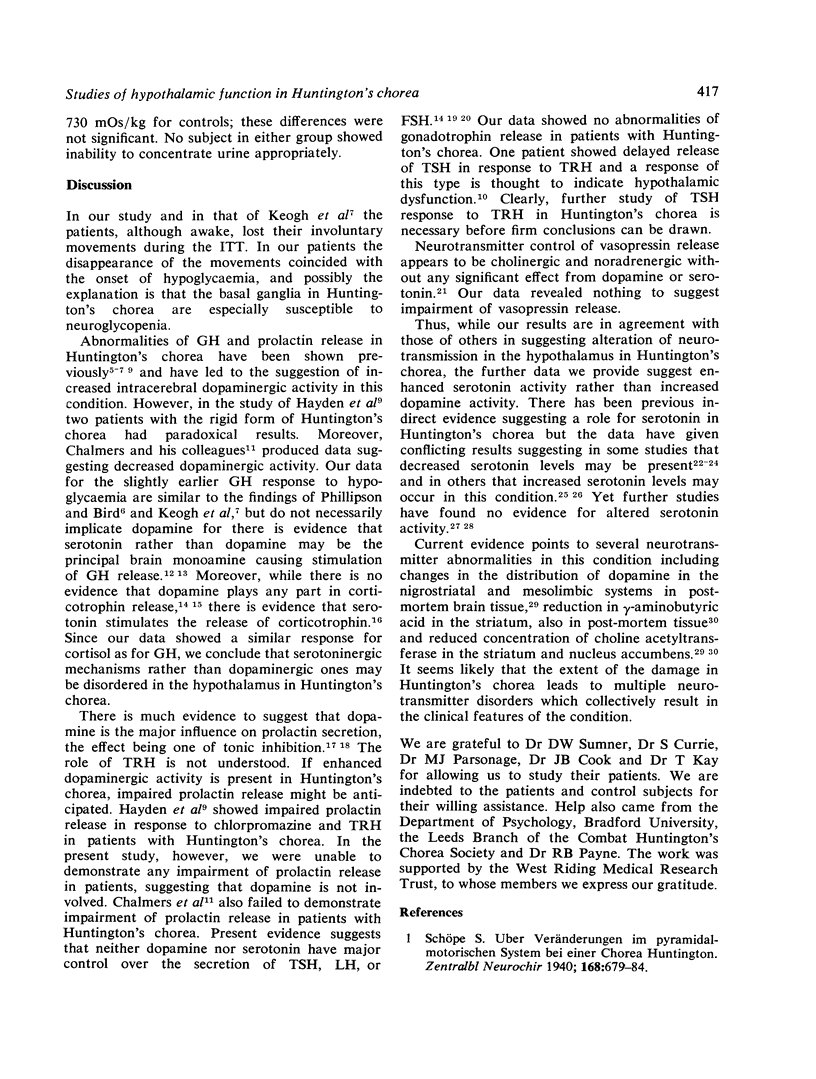Abstract
In eight patients with classical Huntington's chorea hypothalamic function was assessed by the insulin tolerance test, the thyrotrophin releasing hormone test, the gonadotrophin releasing hormone test and water deprivation and the results compared with those of 10 control subjects. All patients ceased to have choreiform movements for approximately 60 minutes during the insulin tolerance test. Four of the patients failed to show clinical features of stress in response to hypoglycaemia. The fasting blood glucose level and blood glucose response to insulin were similar for the two groups. However, the response of plasma cortisol (p less than 0.05) and of growth hormone (p less than 0.05) to hypoglycaemia was earlier in patients than controls, though peak responses were the same for each group. The thyrotrophin releasing hormone test revealed no difference in basal levels of thyroid stimulating hormone in either group, or in peak response to thyrotrophin releasing hormone or in the increment at 20 minutes. One of the patients had a delayed response typical of a hypothalamic disorder, whereas none of the controls had such a response. Mean free thyroxine index levels for each group were similar. There was no difference in basal prolactin level, or in the increment or in the peak level in response to thyrotrophin releasing hormone between each group as a whole or when the males and females were analysed separately. Because of small subgroups, the data from the gonadotrophin releasing hormone test were difficult to analyse, but no clear differences or obvious abnormalities emerged. Water deprivation revealed no evidence of inability to concentrate urine in either group and hence no indication of impaired antidiuretic hormone function. The study supports previous findings of altered hypothalamic function in patients with Huntington's chorea but further suggests that serotoninergic rather than dopaminergic mechanisms may be altered.
Full text
PDF




Selected References
These references are in PubMed. This may not be the complete list of references from this article.
- Bartholini G., Da Prada M., Pletscher A. Decrease of cerebral 5-hydroxytryptamine by 3,4-dihydroxyphenylalanine after inhibition of extracerebral decarboxylase. J Pharm Pharmacol. 1968 Mar;20(3):228–229. doi: 10.1111/j.2042-7158.1968.tb09726.x. [DOI] [PubMed] [Google Scholar]
- Bhargava K. P., Kulshrestha V. K., Srivastava Y. P. Central cholinergic and adrenergic mechanisms in the release of antidiuretic hormone. Br J Pharmacol. 1972 Apr;44(4):617–627. doi: 10.1111/j.1476-5381.1972.tb07301.x. [DOI] [PMC free article] [PubMed] [Google Scholar]
- Bird E. D., Iversen L. L. Huntington's chorea. Post-mortem measurement of glutamic acid decarboxylase, choline acetyltransferase and dopamine in basal ganglia. Brain. 1974 Sep;97(3):457–472. doi: 10.1093/brain/97.1.457. [DOI] [PubMed] [Google Scholar]
- Boyd A. E., 3rd, Lebovitz H. E., Pfeiffer J. B. Stimulation of human-growth-hormone secretion by L-dopa. N Engl J Med. 1970 Dec 24;283(26):1425–1429. doi: 10.1056/NEJM197012242832602. [DOI] [PubMed] [Google Scholar]
- Chalmers R. J., Johnson R. H., Keogh H. J., Nanda R. N. Growth hormone and prolactin response to bromocriptine in patients with Huntington's chorea. J Neurol Neurosurg Psychiatry. 1978 Feb;41(2):135–139. doi: 10.1136/jnnp.41.2.135. [DOI] [PMC free article] [PubMed] [Google Scholar]
- Chase T. N., Watanabe A. M., Brodie K. H., Donnelly E. F. Huntington's chorea. Effect of serotonin depletion. Arch Neurol. 1972 Mar;26(3):282–284. doi: 10.1001/archneur.1972.00490090108012. [DOI] [PubMed] [Google Scholar]
- Eddy R. L., Jones A. L., Chakmakjian Z. H., Silverthorne M. C. Effect of levodopa (L-DOPA) on human hypophyseal tropic hormone release. J Clin Endocrinol Metab. 1971 Oct;33(4):709–712. doi: 10.1210/jcem-33-4-709. [DOI] [PubMed] [Google Scholar]
- Everett G. M., Borcherding J. W. L-dopa: effect on concentrations of dopamine, norepinephrine, and serotonin in brains of mice. Science. 1970 May 15;168(3933):849–850. doi: 10.1126/science.168.3933.849. [DOI] [PubMed] [Google Scholar]
- FORREST A. D. Some observations on Huntington's chorea. J Ment Sci. 1957 Jul;103(432):507–513. doi: 10.1192/bjp.103.432.507. [DOI] [PubMed] [Google Scholar]
- Hall R., Ormston B. J., Besser G. M., Cryer R. J. The thyrotrophin-releasing hormone test in diseases of the pituitary and hypothalamus. Lancet. 1972 Apr 8;1(7754):759–763. doi: 10.1016/s0140-6736(72)90518-1. [DOI] [PubMed] [Google Scholar]
- Hayden M. R., Vinik A. I., Paul M., Beighton P. Impaired prolactin release in Huntington's chorea. Evidence for dopaminergic excess. Lancet. 1977 Aug 27;2(8035):423–426. doi: 10.1016/s0140-6736(77)90608-0. [DOI] [PubMed] [Google Scholar]
- Keogh H. J., Johnson R. H., Nanda R. N., Sulaiman W. R. Altered growth hormone release in Huntington's chorea. J Neurol Neurosurg Psychiatry. 1976 Mar;39(3):244–248. doi: 10.1136/jnnp.39.3.244. [DOI] [PMC free article] [PubMed] [Google Scholar]
- Phillipson O. T., Bird E. D. Plasma growth hormone concentrations in Huntington's chorea. Clin Sci Mol Med. 1976 Jun;50(6):551–554. doi: 10.1042/cs0500551. [DOI] [PubMed] [Google Scholar]
- Podolsky S., Leopold N. A. Growth hormone abnormalities in Huntington's chorea: effect of L-dopa administration. J Clin Endocrinol Metab. 1974 Jul;39(1):36–39. doi: 10.1210/jcem-39-1-36. [DOI] [PubMed] [Google Scholar]
- Poirier L. J., Sourkes T. L., Bouvier G., Boucher R., Carabin S. Striatal amines, experimental tremor and the effect of harmaline in the monkey. Brain. 1966 Mar;89(1):37–52. doi: 10.1093/brain/89.1.37. [DOI] [PubMed] [Google Scholar]
- Refetoff S., Fang V. S., Rapoport B., Friesen H. G. Interrelationships in the regulation of TSH and prolactin secretion in man: effects of L-dopa, TRH and thyroid hormone in various combinations. J Clin Endocrinol Metab. 1974 Mar;38(3):450–457. doi: 10.1210/jcem-38-3-450. [DOI] [PubMed] [Google Scholar]
- Rubovits R., Klawans H. L., Jr Serotonin role in Huntington's chorea. N Engl J Med. 1972 May 25;286(21):1161–1161. doi: 10.1056/NEJM197205252862120. [DOI] [PubMed] [Google Scholar]
- Smythe G. A. The role of serotonin and dopamine in hypothalamic-pituitary function. Clin Endocrinol (Oxf) 1977 Oct;7(4):325–341. doi: 10.1111/j.1365-2265.1977.tb01331.x. [DOI] [PubMed] [Google Scholar]
- Spokes E. G. Neurochemical alterations in Huntington's chorea: a study of post-mortem brain tissue. Brain. 1980 Mar;103(1):179–210. doi: 10.1093/brain/103.1.179. [DOI] [PubMed] [Google Scholar]
- Takahara J., Arimura A., Schally A. V. Suppression of prolactin release by a purified porcine PIF preparation and catecholamines infused into a rat hypophysial portal vessel. Endocrinology. 1974 Aug;95(2):462–465. doi: 10.1210/endo-95-2-462. [DOI] [PubMed] [Google Scholar]
- VOGT C., VOGT O. Precipitating and modifying agents in chorea. J Nerv Ment Dis. 1952 Dec;116(6):601–607. doi: 10.1097/00005053-195212000-00015. [DOI] [PubMed] [Google Scholar]


